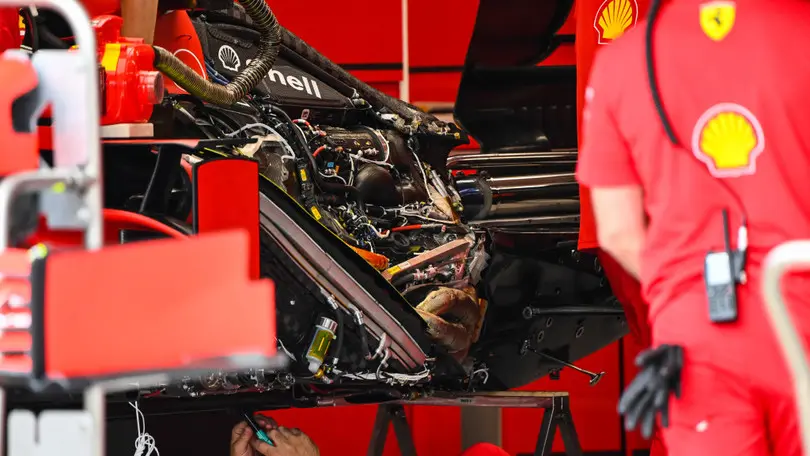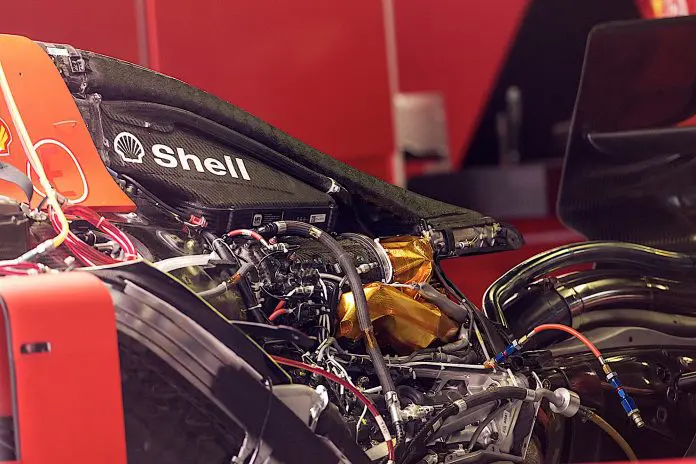F1: we talked about it several times at the beginning of the season. The power unit on the Ferrari SF21 has made a big step forward compared to the 2020 specification. The power deficit that plagued the Italian single-seaters during the past season often forced them to reduce downforce to compensate for the speed gap. This element would create a clear aerodynamic imbalance forcing the two Ferrari drivers to “row” continuously with the steering wheel. Not to mention the difficult tyre management, affected by the wing that was used on average to make up for the aforementioned weakness.
Part of the horsepower found, in addition to raising the speed skills of the Ferrari, have not just widened the set-up window of the car. Such set-up window was way too tight last season. Furthermore, this improvement has given the Maranello engineers the opportunity to increase downforce on the car. The SF21 can actually enjoy a good base balance, which is a key factor in extracting all the performance from the car. Choosing the optimal set-up has undoubtedly guaranteed maximum confidence for the drivers and at the same time allows them to attempt more extreme choices in different circumstances.

However, although the increase in horsepower is tangible, the gap with the top tiers is still significant. The mistake is often made of thinking of maximum power as the only possible goal. In fact, in modern power units, one of the crucial factors capable of making the difference is the efficiency of its components. While on flying laps all the power units express the maximum performance available, in the race it is different.
Being able to choose and adopt a more aggressive mapping for the entire race, in fact, guarantees a surplus of power that automatically lowers the total average lap time. The new specification developed by the Italian engineers has different purposes, with which the Reparto Corse hopes to be able to reduce the gap of the Italian PU from its competitors.
F1-New Ferrari SF21 PU: the endothermic aids the hybrid
In the only update allowed by the regulation for the 2021 season, the “Cavallino” technicians carried out targeted work on the internal components of the ICE, with the clear aim of increasing the efficiency of the combustion chamber and consequently lowering consumption. The new specification that will be introduced therefore promises an important leap in terms of power, which, moreover, will help to “fight” resistance to advancement with higher top speeds at the same downforce compared to the old specification.

The endothermic engine will therefore be able to release a higher amount of horsepower, and it is clear that the greater the power that can come from the engine, the less the need to rely on the hybrid part in certain situations which, alone, cannot to support the car’s thrust in the hot phases of the race such as overtaking or defending. This is why, indirectly, the new internal combustion engine will ensure better hybrid management.
F1-New Ferrari SF21 PU: an optimized hybrid
The new specification that will be fitted on the SF21 in the second half of September will also see an enhanced hybrid system. This aspect is often underestimated and in general there is very little talk about it. Each team tries to spread the energy of this system in various points of the track. Such balance is not easy to find, as the power unlocked during the lap must guarantee a clipping value as low as possible and, at the same time, push the car to the maximum in the portions of the track where the weight / power coefficient is predominant.
This operation is usually carried out during FP1, when the engineers test various configurations to calibrate the system (take a look at Charles Leclerc’s on board videos to learn more). At the end of the first day, the most efficient model is then chosen to be used for all weekends.

In Ferrari’s case, the charging mode of the hybrid system is managed through the Soc (state of charge) command. Activated through a wheel located on the left side of the steering wheel, the mapping adjusts the ratio between energy generated and that spent over the course of a lap. Hence, the higher the value, the lower the deliberate power. On the contrary, the lower the number associated with the Soc abbreviation, the greater the power available.
When compared to Mercedes and Honda, the lack of horsepower that the current Ferrari internal combustion engine has allows the Cavallino drivers to use more extreme Soc configurations for a very short time. This is because the hybrid is also used to make up for the power deficit of the ICE. This situation, added to the suboptimal efficiency of the hybrid system, tremendously complicates the attack and defense phases, where even the use of the K2, K1 and K1 Plus overboost are often not very effective.

That is why the hopes placed on the new specification are very high. If the expectations are met, the usable benefits will be many. In this regard, there is something else to add, for one last time in this piece. Having a plus of power in acceleration means not letting the opponent get close enough to allow them to overtake. Exactly what McLaren did with Ferrari throughout the first part of the world championship, often keeping the red cars at bay easily, although the pace was actually less competitive.
F1-Author: Alessandro Arcari – @Berrageiz
Translation for: Beatrice Zamuner – @ZamunerB
Foto: Scuderia Ferrari

